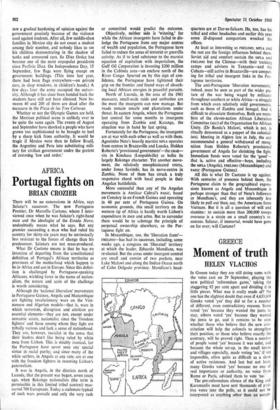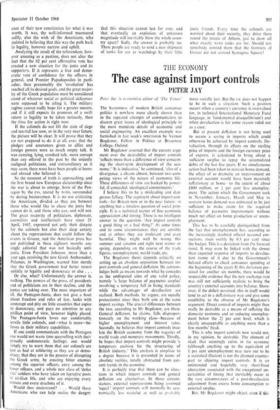Moment of truth
GREECE HELEN VLACHOS
In Greece today they are still doing sums with the votes cast on 29 September, playing the new political 'referendum game,' taking the staggering 92 per cent apart and dividing it in little pieces. What was it really made of? No one has the slightest doubt that even if 4,633,609 Greeks voted 'yes' they did so for a number of different, even contradictory reasons. Some voted 'yes' because they wanted the junta to stay, others voted 'yes' because they wanted the junta to go, and it remains to be seen whether those who believe that the new con- stitution will help the colonels to strengthen their position, or those who believe exactly the contrary, will be proved right. Then a number of people voted 'yes' because it was safer, and because the whole set-up, in the small towns and villages especially, made voting 'no,' if not impossible, often quite as difficult as a show of active resistence. And last but not least, many Greeks voted 'yes' because no one of real importance or authority, no voice from Rome or Paris, advised them to vote 'no.'
The pre-referendum silence of the King and Karamanlis must have sent thousands of posi- tive votes into the polls, as it could not be interpreted as anything other than an accept- ance of their new constitution for what it was worth. It was, the well-informed murmured softly, also the wish of the Americans, who insisted in believing that this was the path back to legality, however narrow and uphill.
Analysing the result of the referendum, how- ever amusing as a pastime, does not alter the fact that the 92 per cent affirmative vote has created a new situation for the junta and its supporters. If it represents a free and demo- cratic vote of confidence for the officers in general, and Premier Papadopoulos in parti- cular, then presumably the 'revolution' has reached all its desired goals, and the great major- ity of the Greek population must be considered cured of whatever social or political sicknesses were supposed to be ailing it. The military regime cannot really hope for a greater success, and if it still expects its promises of a swift return to legality to be taken seriously, then the time for action is right now.
If the colonels do not lift the state of siege and martial law now, or in the very near future, the picture will be clear. It will prove that they are not prepared to do it at all, ever, that the pledges and assurances given to allies and foreign powers were so much empty talk. It was cunning, lying, crooked talk, more corrupt than any offered in the past by the unjustly maligned politicians, and extraordinary as it may seem, there must have been people at home and abroad who believed it.
So the moment of truth is approaching, and the first brand new European dictatorship since the war is about to emerge, born of the Pen- tagon by the CIA, reared by NATO, surrounded by doting businessmen. It is no use criticising the Americans, divided as they are between those who would like to chase the junta but cannot do it, and those who can, and will not. The great majority of politicians, diplomats, journalists and intellectuals have since 21 April, 1967, expressed not only their distaste for the colonels but also their deep anxiety about the repercussions that could follow the events in Greece, and the American press has not published in these eighteen months one single editorial that was not basically anti- junta. Even President Johnson, more than a year ago, receiving the new Greek Ambassador, Palamas, in Washington, warned him sternly that the Greek government had better return quickly to legality and democracy or else . . .
Or else, what? Unfortunately the answer is, nothing. The powers of the press, of presidents and of politicians are in their decline, and the juntas are taking over. The most important of all, the Pentagon-Junta, does not give a hoot about freedom and rules of law, looks with contempt and pity on little countries that aspire to democracy, and pays no attention to any civilian point of view, however highly placed. The Pentagon-Junta loves our comfortably servile little colonels, and—what is more—be- lieves in their military capabilities.
If one could communicate with the Pentagon one would not waste time quarrelling with their proudly undemocratic feelings; one would simply try to warn them that our colonels are just as bad at soldiering as they are at demo- cracy; that they are in the process of disrupting the Greek army, by creating bitter enemies among the superior officers, envy among the lower officers, and a whole new class of `dolce vita' soldiers who have taken on lucrative posts in civilian life, and who are enjoying every minute and every drachma of it.
Would they understand? . . . Would those Americans who can help realise the danger:
that this situation cannot last for ever, and that eventually an explosion of unknown magnitude will inevitably blow the whole coun- try apart? Sadly, the answer is probably no. These people are ready to send a new shipment of tanks for use as watchdogs by their little junta friends. Every time the colonels are worried about their security, they drive them round the streets of Athens, just to show off what exactly NATO tanks are for. Should not somebody remind them that the frontiers of Greece are not around Syntagma Square?







































 Previous page
Previous page